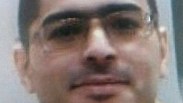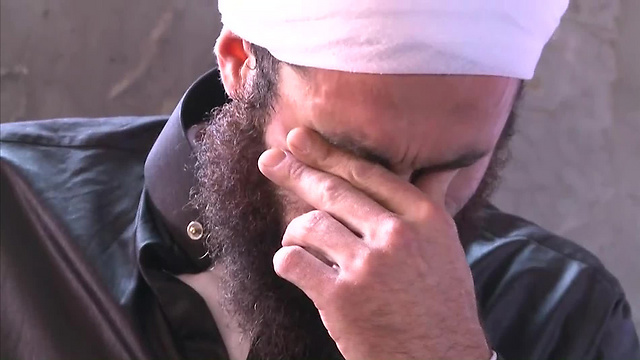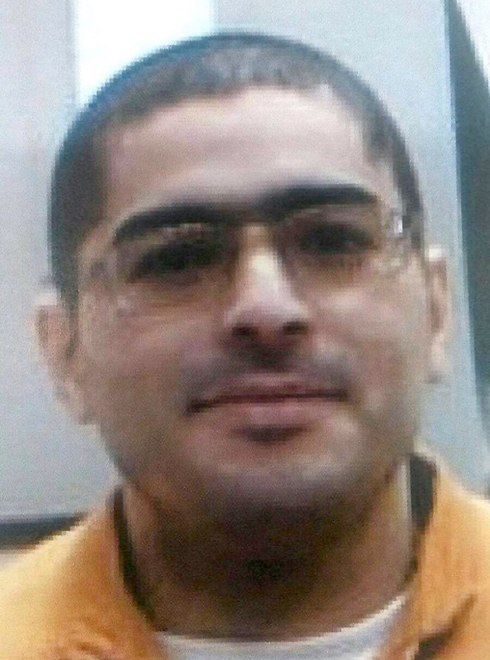
Portrait of a killer: Tel Aviv shooter's relatives speak
Although the search for Nashat Melhem is now over, ending with his death in Arara following a brief gunfight, questions remain over his motives, his background and who helped him evade capture for a week. Interviews with Melhem's family members conducted a few days before his discovery shed some light on Melhem's troubled past.
When we arrived at the Melhem family home in 'Ara, a few days before the week-long manhunt for Nashat Melhem ended in his death, a small flock of sheep was just crossing the broken road at the front of the house. An old shepherd was hitting one sheep, which was stubbornly trying to cut to the nearby olive orchard, with his stick.
It was late afternoon on Wednesday and the women of the family said the son Jodat just went in to take a shower. Jodat spent five days under arrest on suspicion of aiding his brother Nashat, who committed the terror attack on Dizengoff Street in Tel Aviv. Jodat had just recently returned home after being released, and was quick to wash himself of the experiences of the interrogation.
He came out of the shower fresh, and looked good as new, but there are still some things that cannot be washed away. Wearing a black galabiya, his beard long and unkempt, and a white kerchief on his head, Jodat was sitting there, uncontrollably shaking. It's hard to get your mind straight again after the Shin Bet's intensive interrogations, when at home there's a gaggle of reporters who won't give you a moment's rest until you throw some words their way.
"The interrogation was okay," he said, another shiver running through his body. "I'm innocent because I didn't do anything. The fact that I have a beard doesn't mean anything. You Jews have people with beards and it doesn't mean anything. I understand what tragedy the families whose children were murdered are going through, it's not easy for them. A father whose child dies like this, it's not an easy thing."

After this he started weeping uncontrollably. Not the kind of crying that comes from deep inside and helps you get everything out, but a strangled cry of pent-up emotions. A relative helped him up and led him inside the house.
Barely 1.60 meters high
It's a three-story house at the elevated edge of the village. Three families live in the complex: Father Mohammed's two brothers and some of his eight children. His son, the terrorist who fired indiscriminately in the middle of Dizengoff Street, was 29 years old, with a pile of problems. His brother Jodat, 33, used to work in construction and in gardening, but about a year ago started praying regularly, grew a beard, and stopped working. He joined a charity organization, a Dawah, which works to proselytize and preach Islam to the young men in the area, and is not affiliated to any nationalistic or political movement in the area.
The family moved to 'Ara about two years ago. Before that they lived in the neighborhood of al-Daharat in the village of Arara, at the Melhem clan complex, where Nashat and Jodat were born, and where Nashat was shot dead on Friday afternoon. It's a medium-sized clan of some 2,000 people. The family holds lands on both sides of the Wadi Ara road, Route 65, both in Arara and in 'Ara.
Father Mohammed, 64, who worked in construction for most of his life and only started working in security over the last decade due to his age, decided to leave the crowded al-Daharat and build a big and spacious house at the edge of 'Ara, on a plot of land he owns. That is why the residents around here hardly know the family at all, and especially son Nashat, who did not spend a lot of time in the village, but rather in Arara across the road.
Those who knew Nashat describe him as someone with a short fuse, who always walked around with an angry expression and his arms spread to the sides. "He walked around a bit like Abu Ali," says a distant relative. "But it was a bit funny because he's small, barely 1.60 meters high, perhaps even less. He'd sit down for a conversation for two minutes and all of a sudden get up in anger, throw his chair aside, and leave, and you didn't even know what pissed him off."
Another relative says Nashat was the black sheep of the family. "For the father, respect has always been important. To treat others with respect and to have others treat him with respect. Nashat's behavior and his entanglements were very hard on him. It didn't help his health or his honor. He himself has volunteered with the police, he had a certificate and he was very proud of it. Think about it, he was given a license to carry arms 20 years ago, and for an Arab in Israel, it's no simple thing to get a license."
Everyone in Arara and in 'Ara knew that the father Mohammed had a gun license. Maybe that's why not everyone likes him in Wadi Ara, because such a license is considered an admittance that its owner works with Israeli security forces. "Show me an Arab man who doesn't work with Israeli security forces and has a gun license," protests one of the village's residents.
The story of the confiscation of the father's weapon and its being returned to him also raised a series of theories and rumors. Last August, the Melhem family was involved in a neighborly dispute that brought the police to the village. The father's weapon, an Italian-made Spectre submachine gun, also called a "Falcon," was taken away from him. His lawyer Nechami Feinblatt helped him appeal the decision. "It was very important to him to get his weapon back," the lawyer said. "For him, it's a kind of an insult, hurting his status. He has no criminal record and he never got into trouble, so he insisted on fighting to have his license and weapon back."
And so it was. In October, the father's appeal was accepted. His license and his weapon were returned to him. Three months later, last Friday, Nashat used it to fire bursts, on automatic, and murdered Alon Bakal and Shimon Ruimi at a bar in Tel Aviv. Later, while he was on the run, he murdered taxi driver Amin Shaban in northern Tel Aviv as well. It was also the weapon Melhem opened fire at Israeli security forces with in Arara on Friday, before being shot dead by their return fire.
A violent past
How much could a person's past tell of his future? When he was 18, Nashat was arrested after selling 1.1 kg of pot to an undercover police agent for NIS 16,500. He himself smoked drugs at the time, and even admitted to it. Since he did not have a criminal record, the Nazareth District Court agreed to release him, provided he committed to joining a rehab program. His relatives say Nashat started the rehab program, but they don't know if he ever completed it.
A year later, his cousin Nadim Melhem was shot to death by a police officer during a search for weapons in his home. Relative Ahmad Melhem says that Nashat was very close to Nadim. "Despite the age difference between them - Nadim was 28 when he died and Nashat 19 - they had a tight bond. Nashat admired him. They partied together, stayed at the same home, spent a lot of time together. This incident (Nadim's death) stirred up emotions around here, large protests were held, the Wadi Ara road was blocked, we were all in shock. Nashat also took it very hard."
A year and a half later, at the Karkur Junction, Nashat tried to snatch a weapon from a soldier sitting at a bus station. He fought with the soldier, stabbed him with a screwdriver, and when he failed to steal the weapon, left the scene on foot, got on a bus to Hadera, wandered around there for a few hours, and went home, where police were waiting for him. Reports of the incident said Nashat admitted to trying to commit a terror attack, in revenge for his cousin's death. He was sentenced to five years in prison, which he served at the Shata and Ayalon prisons.
His legal representative in the drugs and attempted terror attack cases, Attorney Sami Melhem, a distant relative, says that even back then, Nashat gave the impression of an angry young man that had a hard time controlling himself. "He appeared insane. He'd walk around and his entire body was twitching.
"While he was under arrest for attempting to steal a weapon from a soldier, another indictment was filed against him for assaulting a police officer," Sami Melhem continued. "It was my impression that he was detached from reality, because he was talking nonsense. In prison, he had a problem of violence, and the Prisons Service always gave him negative reviews when he filed requests for benefits or to have a third of his sentence commuted.
"I'm not trying to build him a line of defense now. Even at the time I identified he had violent issues. I even stated it to the court. Asked that he receive treatment. It was very clear he needed it. I don't know what they tried to do with him, whether they tried to rehabilitate him or whether he cooperated, but one thing is clear: He was allowed back into a home where a licensed weapon was being kept."
Ahmad Melhem, a member of the Arara-'Ara council, also a distant relative, says that after he was released from prison, Nashat went to work in Tel Aviv and came to visit his family in Arara on weekends. "I was living across the street from them and when he would see me, he'd come and shake my hand, and then carried on with his business. One thing I can say about him with almost complete certainty: He doesn't belong to any political organization or any nationalistic or religious movement. He has no ideology about anything. If I look at the trauma from the death of his cousin, it might be that this incident burdened his subconscious and drove him to commit this murder."
His brother Jodat was arrested on Saturday and released on Wednesday, despite the fact that the police appealed the decision. The father, who reported to police that his son was the shooter, was arrested on Monday night on suspicion he helped Nashat escape. The mother was questioned as well and claims that Shin Bet interrogators threatened that the family home would be demolished if she didn't tell them where her son was. Extensive searches were conducted all over Wadi Ara, and relatives received surprise visits from Yasam (Israel Police's special patrol unit) and Shin Bet forces that were searching their homes.
Questions remain over who knew that Nashat was in the area, and who was helping him hide. The photos that emerged on Saturday afternoon of one of his hideouts showed a supply of food, drink and cigarettes.
"Nashat grew up in the al-Daharat neighborhood and had good relations with everyone who lives there," said a resident. "Many people knew that he was here, but it was difficult for them to snitch and inform the police.
"His family members also didn't want to be responsible for his arrest and preferred to protect him until the last moment," the resident added.













